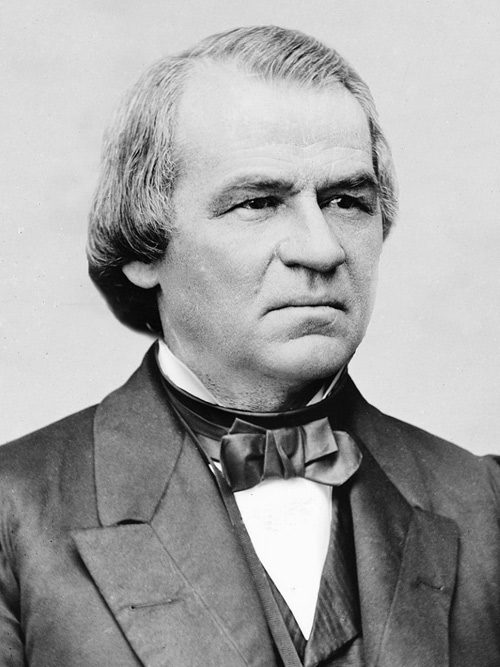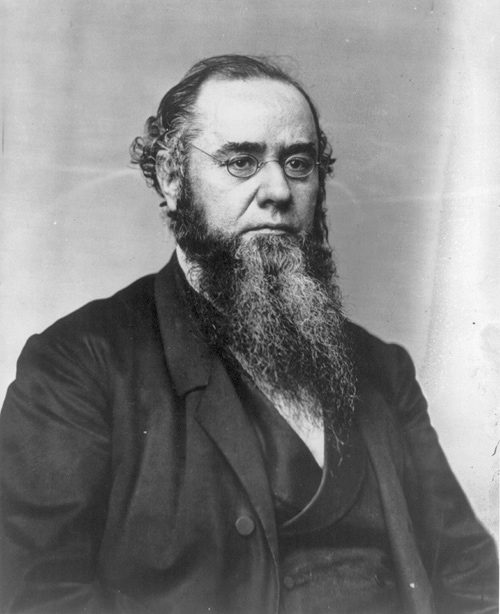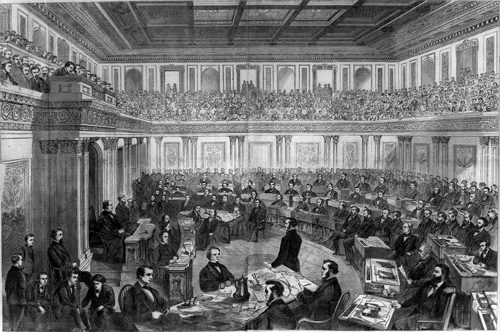Considering History: The Presidency and Impeachment of Andrew Johnson
This column by American studies professor Ben Railton explores the connections between America’s past and present.
One hundred fifty years ago, Andrew Johnson became the first president of the United States to be impeached.
In 1864, facing a stiff challenge to his reelection campaign from Democratic nominee (and former Union general) George McClellan, President Abraham Lincoln decided to replace his current vice president, Hannibal Hamlin, on the ticket with a Democrat, Tennessee Senator and military governor Andrew Johnson. This choice allowed Lincoln and Johnson to run under the banner of the newly created National Union Party, emphasizing opposition to the Confederacy across the nation (and especially in contested border states like Tennessee). It was a pragmatic and clever strategic move, and likely contributed greatly to Lincoln’s eventual easy victory over McClellan in November 1864.
Yet as early as inauguration day, March 4, 1865, there were indications that Lincoln’s practical decision might have also been a mistake. Johnson may have been drunk at the inauguration (he had been witnessed drinking heavily at a party the night before and asked Hannibal Hamlin for two additional drinks just before the inauguration began), and in any case delivered a rambling, belligerent speech that was hastily cut off when Hamlin swore him in as the new vice president. And this ominous opening foreshadowed what would become, after Lincoln’s tragic April 14th assassination, one of the most divisive and destructive presidencies in American history.

Johnson continued his pattern of belligerent and bellicose public statements as President. When supporters came to the White House in February 1866 for a Washington’s Birthday celebration, Johnson addressed them in another long, rambling speech, highlighting his own accomplishments more than 200 times and attacking “men still opposed to the Union” who were “as much laboring to pervert or destroy [fundamental American principles] as were the men who fought against us.” When pressed by audience members, he named Congressman Thaddeus Stevens and Senator Charles Sumner (among others) as these enemies. In August and September of that year he would embark on a national speaking tour unprecedented for a sitting president; known as the “Swing Around the Circle,” the tour featured more than twenty rallies in which Johnson continued to attack Congressional “enemies” and make the case for his divisive Presidential Reconstruction policies ahead of the November midterm elections.
Those extreme Presidential Reconstruction policies truly defined Johnson’s divisive and disastrous administration, both on their own terms and in contrast to what might have been the case had Lincoln not been killed. Although Johnson had been perceived as a moderate on issues of slavery and sectionalism prior to and during the Civil War, as president he revealed himself to be both a staunch ally of the neo-Confederate South and a virulent white supremacist. Among his earliest presidential proclamations, Johnson first recognized a provisional Virginia government that was practicing policies of forgiveness toward ex-Confederates and then provided federal amnesty for nearly all ex-rebels. He went on to support additional amnesty policies such as one that allowed ex-Confederates (such as former vice president of the Confederacy Alexander Stephens) to serve in Congress; since Johnson’s administration likewise opposed proposals for African American voting rights, nearly all of the Southerners elected to Congress in these early post-war years were former Confederates.
Johnson’s opposition to post-war rights for African Americans went far beyond opposing suffrage proposals. In February 1866 he vetoed a bill that would have extended the vital operations of the Freedmen’s Bureau beyond the agency’s scheduled 1867 abolition, claiming that the law “would not be consistent with the public welfare.” In March of the same year he vetoed the groundbreaking Civil Rights Bill, arguing in his veto message that “the distinction of race and color is by the bill made to operate in favor of the colored against the white race.” Johnson also opposed the 14th Amendment and campaigned extensively (if unsuccessfully) against its ratification by the states, solidifying his administration’s overall hostility to nearly all Reconstruction measures that focused on civil rights rather than reintegrating the Confederate South into the nation as smoothly as possible.

All those conflicts contributed to Johnson’s February 1868 impeachment by the House of Representatives, but it was his blatant, authoritarian violation of a specific law that directly precipitated the Congressional action. During his 1866 speaking tour, Johnson had pledged to fire Cabinet secretaries who did not agree with him (especially those who had been appointed under Lincoln), and in March 1867 he vetoed the Tenure of Office Act, which required Senate approval for such firings; Congress overrode his veto and passed the act into law. Throughout that year Johnson battled with Secretary of War Edwin Stanton, a Lincoln appointee and advocate of Congressional Reconstruction, harsher treatment of former Confederates, and African American rights. In August, with Congress out of session and unable to approve any Cabinet actions, Johnson demanded Stanton’s resignation; when Stanton refused, Johnson suspended him and replaced him with General of the Army Ulysses S. Grant. The conflict continued for many months, and when Johnson permanently dismissed Stanton in February 1868 without gaining Senate approval as required by law, the House of Representatives voted 128 to 47 to impeach.
After a three-month trial in the Senate, featuring so much wheeling and dealing that Johnson and his allies would later be investigated by Representative Benjamin Butler for bribery, the Senate on May 16, 1868, fell a single vote short of the two-thirds majority necessary to convict the president. Johnson would complete the remainder of his term, but as a deeply unpopular president; even his own Democratic Party denied him the 1868 presidential nomination in favor of former New York Governor Horatio Seymour (who would lose to the Republican nominee Ulysses S. Grant). On Christmas Day, 1868, Johnson took advantage of one of his last opportunities to further his neo-Confederate and white supremacist agendas, issuing a blanket amnesty that covered all former Confederates including the Confederate President Jefferson Davis.

Johnson’s political career did not quite end with Grant’s election, as he made a successful run for a Tennessee Senate seat (at that time still decided by the state legislature) in early 1875. He would only serve for a few months before dying unexpectedly of a stroke in July, but during that time expressed his neo-Confederate views one last time (his only official remarks during his brief Senate term), criticizing Grant’s use of federal troops in Louisiana and asking, “How far off is military despotism?” One final belligerent and extreme remark from a president who remains one of the most divisive and destructive in American history.